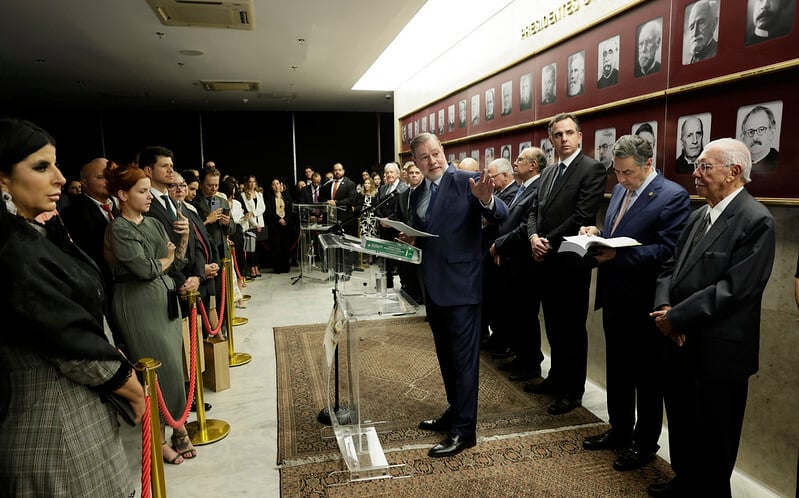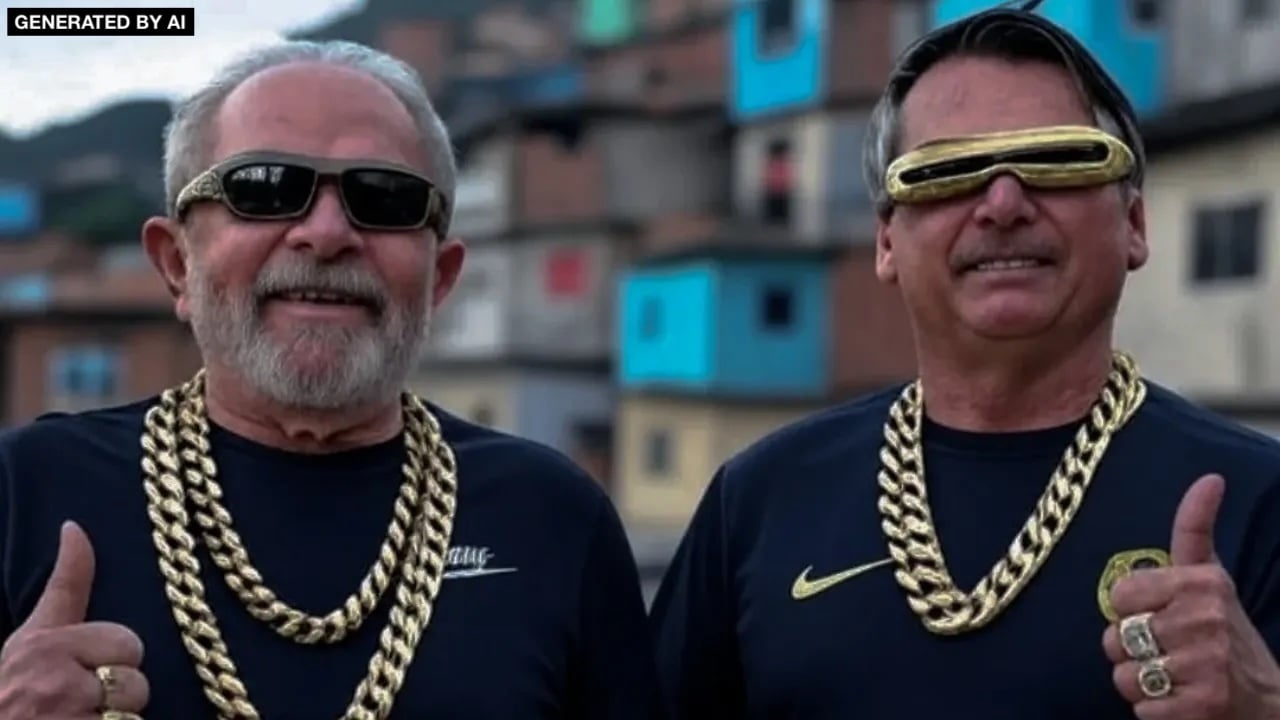Hello! Welcome to another edition of the Brazil Society newsletter! This week, we’re talking about how Brazil’s conservative movement is trying to push back on Brazil’s answer to gangsta rap.
If you have any questions about this newsletter, or topics you’d like to see covered in future issues, you can reach me at [email protected]
This is a free newsletter. To unlock the full Brazilian Report experience, upgrade to a Premium plan!
A MESSAGE FROM MINDSTREAM
Your daily AI dose
Mindstream is your one-stop shop for all things AI.
How good are we? Well, we become only the second ever newsletter (after the Hustle) to be acquired by HubSpot. Our small team of writers works hard to put out the most enjoyable and informative newsletter on AI around.
It’s completely free, and you’ll get a bunch of free AI resources when you subscribe.

Crime rhymes: Brazil conservatives battle over violence-themed music

Trap singer Oruam is to Brazilian right-wingers what N.W.A was to their American conservatives in the 1980s and 1990s — public enemy number one. Photo: Oruam/Instagram
In a country where more than 23 million people live in areas controlled by drug gangs or militias — as Brazilians call urban paramilitary mafias — it is unsurprising that some of Brazil’s biggest cultural hits grapple with the theme of crime, even if critically. Acclaimed films such as “Elite Squad” and “City of God” are prime examples.
Yet across Brazil, conservative lawmakers argue that many artists do more than portray crime — claiming that they glorify it, aiding recruitment for criminal organizations and normalizing violence. Armed with this argument, they have introduced bills to prevent government funding for concerts that appear to promote organized crime or drug use, sparking a debate about censorship and racial discrimination.
The movement gained momentum when São Paulo City Councilwoman Amanda Vettorazzo introduced a bill to prevent government funding for performances that allegedly promote organized crime or drug use. The bill, which has inspired similar proposals from federal lawmakers, specifically targets events accessible to young people.
At face value, shielding minors from criminal influence might seem like common sense. But the debate takes on added complexity when lawmakers invoke the measure to target specific artists — most notably, the trap singer Oruam — while ignoring other popular genres, such as sertanejo — Brazil’s dominant country music genre, which frequently romanticizes heavy drinking, machismo and, at times, domestic violence.
Indeed, any attempts to regulate artistic expression come up against contradictions and shortfalls. Strict rules and the creation of art typically do not go hand in hand.
Trap music, an offshoot of rap, originated in black urban communities in the US and carries deep social and racial significance. Similarly, Brazilian funk, which gained global recognition through artists like Anitta, is often explicit in its themes. By contrast, sertanejo receives multimillion-dollar backing from agribusiness, and its leading stars are overwhelmingly white men.
Beyond limiting performances for minors, the proposed law would also bar the government from sponsoring or promoting any artist, event, or show — regardless of audience — that is deemed to endorse organized crime or drug use.
Similar discussions were present in US public debate in the 1990s, when gangsta rap, which viscerally depicted street violence in inner-city communities, made its way into the charts. Critics said it encouraged nihilistic behavior and fueled crime rates. The debate reached such heights that the US Congress held hearings on the “dangers of hip hop.”
“This moralistic and hypocritical wave resurfaces whenever a form of black cultural expression gains widespread appeal — just as it did with samba, rap and capoeira,” said São Paulo State Assemblywoman Ediane Maria, who leads a caucus advocating for Brazilian funk music. She criticized São Paulo Mayor Ricardo Nunes for backing what has been nicknamed the “Anti-Oruam Bill.”
Indeed, samba was criminalized in the early 20th century, with authorities detaining individuals simply for carrying a pandeiro, a percussion instrument central to the genre. In recent decades, attempts to outlaw Brazilian funk parties in marginalized communities have proliferated.
Maria argues that such efforts criminalize funk culture and expose partygoers to disproportionate police violence. She pointed to the 2019 Paraisópolis Massacre, when a heavy-handed police operation at a Brazilian funk party led to nine young people being killed by asphyxiation after officers used tear gas in a confined space.
Cultural critics have raised similar concerns, likening these policies to selective censorship. Rock music, they note, has long referenced drug use without facing the same scrutiny.
Vettorazzo, who penned the “Anti-Oruam Bill,” claims she has received threats over her stance against Oruam, who has encouraged his followers to retaliate online, calling her “mentally ill,” an “idiot,” and even using a prison slang term to suggest that she should be raped.
The lawmaker insists it is necessary to ensure that public money does not fund what she calls a “culture of weapons and drugs” that glorifies organized crime. Still, many lawmakers supporting the bill also backed former President Jair Bolsonaro’s efforts to loosen gun control laws between 2019 and 2022 — measures that significantly expanded gun culture and increased criminals’ access to firearms.
A redundant move
Danilo Cymrot, a law PhD and author of “Funk on the Beat: Party, Street and Parliament,” views the political push as a discriminatory attack on marginalized music genres. He notes that existing laws already regulate content that could expose minors to crime.
Brazil’s Statute of the Child and Adolescent mandates that the government oversee age-appropriate content ratings for shows. The Penal Code stipulates fines and up to six months in prison for anyone convicted of explicitly advocating crime.
Cymrot also points out that public officials can already include contract clauses requiring pre-approval of setlists for government-funded events. “The problem is stripping public officials of this discretion and preemptively banning certain artists,” he said, warning that defining what constitutes advocating crime is highly subjective.
The bill would go even further, granting police the power to determine what qualifies as an infraction. Officers could issue violation reports, with the law requiring artists to repay their entire performance fee as a fine.
The case against Oruam
Oruam, whose legal name is Mauro Davi dos Santos Nepomuceno, has been a focal point of the bill’s promotion — likely by design. With more than 8 million Instagram followers, his prominence ensures political mileage for those taking a stand against him.
His background also makes him an emblematic target. Oruam is the son of Marcinho VP, a high-ranking member of the Comando Vermelho (Red Command, or CV), one of Brazil’s largest criminal organizations. His father has been imprisoned for murder and drug trafficking since the mid-1990s. Oruam has a tattoo honoring both his father and Elias Maluco, an infamous convicted drug trafficker who brutally killed a journalist in 2002.
Last year, at Lollapalooza, one of Brazil’s largest music festivals, Oruam wore a T-shirt calling for his father’s release. “Prison should rehabilitate, not torture,” he later wrote on social media. “My father made mistakes, but he’s paid his dues.”
In his music, Oruam frequently references sex, money, weapons and the realities of life in Rio de Janeiro’s favelas. One of his music videos, depicting an armored car heist, includes a disclaimer emphasizing its fictional nature.
“All my homies carrying a rifle / All my homies carrying a glock / Their plan is to stop [Avenida] Brasil / And blow up the fucking armored car,” he sings. The song’s video clip has amassed over 120 million views on YouTube in two years.
On February 20, amid the controversy over the legislative push, Oruam was detained after fleeing a police stop, driving against traffic. The incident only added to his reputation as one of the most notorious artists living on the fringes of Brazil’s mainstream.
Quick catch-up
🧑⚖️ The Inter-American Court of Human Rights condemned Brazil for failing to investigate the murder of rural worker Manoel Luis da Silva, shot dead in May 1997, by employees of a farm in the state of Paraíba. This is yet another case of violence and impunity that historically marks the land conflicts in the northern and northeastern regions of Brazil.
☝️The Unified Movement of Braskem Victims, which brings together those affected by geological events caused by abusive mining practices in Maceió since 2018, is requesting participation as creditors of reparations in the negotiations between Braskem's current controlling companies, Novonor (formerly Odebrecht) and Petrobras, and its creditor banks, to define the new business control.
This week, they published an open letter warning Itaú, Banco do Brasil, Santander, Bradesco and BNDES about the extent of the liabilities.
🪩 Lady Gaga has confirmed that she will perform in an open-air, free-to-attend show on Copacabana Beach on May 3, thrilling her vast fan base on social media. Last year, Madonna's concert in the same place brought together 1.6 million people, according to Rio’s municipal government.










